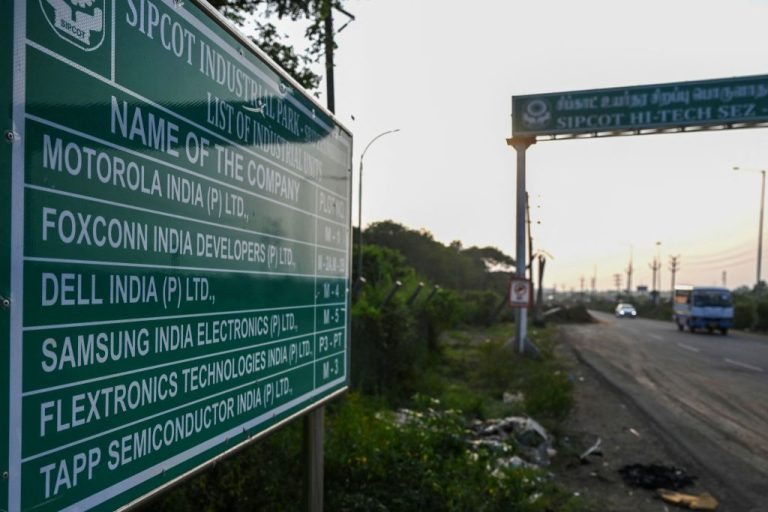Cell phone, gadget, and computer producer Apple has increased the amount of iPhone production the company has transferred away from mainland China to India by a factor of seven, according to new reports.
“People familiar with the matter” gave the statistic to Bloomberg, which published it in an April 12 article where the outlet also revealed that Apple assembled 7 percent, amounting to over $7 billion worth of iPhones in India instead of China in 2022.
That figure was up from 1 percent of world production being made in India in 2021, the outlet said.
The shift is a significant continuation of a trend wherein Communist China is losing its status as the “world’s factory” in the wake of the CCP’s “zero-COVID” policy blunder, which left much of the whole country under total house arrest and social credit control for the better part of two years.
MORE ON APPLE
- Top App Reviewer Sues Apple for Unjust Termination After Approving Application ‘Critical of the Chinese Government’
- Apple‘s Suppliers Use Forced Labor Uyghurs While Refusing to Hire Minorities, Report
- Apple Complied With 100% of Chinese Government App Store Takedown Requests in 2020: Report
Transferring production to India wasn’t as shallow a move as a temporary displacement. Bloomberg stated that Apple’s “longtime partners” had “added assembly lines at a rapid pace over the past year.”
Success
You are now signed up for our newsletter
Success
Check your email to complete sign up
Sources told the outlet that the information wasn’t currently public.
Bloomberg stated that Foxxcon, which makes much of Apple’s product in Zhengzhou at a facility dubbed “iPhone City” was said to have “struggled last year with chaos.”
The “chaos” for the company “drove home vulnerabilities in Apple’s supply chain and forced it to cut output estimates.”
Although Bloomberg declines to elaborate what the situation at iPhone City was about, a December 2022 article by Financial Times titled “Inside the COVID Revolt at the Zhengzhou ‘iPhone City’ Plant” explained that the facility suffered “more than a month of disruption” allegedly “triggered by a COVID-19 outbreak.”
Foxconn, a Taiwan-based company, was still “struggling to staff assembly lines” even after Xi Jinping relaxed “zero-COVID” after taking a third term as leader of the government last year.
The article said that “when Zhengzhou started registering Covid-19 infections in mid-October, Foxconn put its plant under ‘closed loop’ management, barring staff from leaving the site. But as infections started spreading inside the factory town, many workers fled the campus.”
“A person who has been conducting electronics supply chain audits in China for more than a decade” represented to FT that the cause of the problems at the factory was incited by Zero-COVID, but was rooted in “faultlines” that “were between the company, subcontractors and local government, and that’s been a problem over many years.”
The situation has proved a boon for India more than just in terms of creating manufacturing jobs and tax revenue. Apple announced on April 10 that the company will open its first retail stores in Mumbai and New Delhi on the 18th and 20th.
The openings will be personally presided over by CEO Tim Cook, Bloomberg reported in a second article.
The exodus away from China both reaches farther back and extends to more companies than Apple’s recent waves.
An October 2022 Financial Times article reported that a survey by the American Chamber of Commerce in Shanghai of 307 companies found that 20 percent were cutting back on investment, specifically citing the Party’s lockdown measures as a cause.
In January 2022, a spokesperson for the German Chamber of Commerce in Shanghai made headlines when he told Germany’s media that stretches of extended city-wide total lockdowns under the regime’s policy had disrupted the supply chain and led to widespread pessimism among his country’s industry operating in the mainland.
Bloomberg added in its article on the transfer of power from China to India that although representatives for Foxconn did not respond to requests for comment, that the company “plans to invest about $700 million on a plant in a southern state to make phone components and possibly iPhones.”
Forbes reported in March that Foxconn is planning to build the factory in Bengaluru, described as “India’s IT hub.”
And while the factory will employ a staggering 100,000 people, Forbes notes that this is only one third the size of Foxconn’s Zhengzhou lockdown site.
Reuters also reported in March that Foxconn would create a second factory in the state of Telangana, producing another 100,000 jobs.
For both the Communist Party and the Chinese citizens who rely on outsourced production from international companies as a source of income, the developments are a dark omen. Bloomberg states that based on its analysis that dependence on Chinese manufacturing “could be reduced by 20-40% in most cases” as soon as 2030.
An April 5 article, also by Bloomberg, adds that not only is iPhone production moving to India, but Vietnam will start producing Airpods and Macs, Malaysia will produce Macs, and even countries as far west as Ireland where the iMac is already made will see an increase in production for a “range of simpler products.”
Notably, the article stated that Apple had deployed what it internally calls “tiger teams” to “set up shop in suppliers’ factories in China and other countries” in order to “assemble more extensive lists of backup suppliers for every component, right down to screws and plastic inserts.”
In September 2021, U.S. banking cornerstone JP Morgan told clients in a note that Apple is expected to move no less than a quarter of its total production from China to India as soon as 2025, Techcrunch reported.















